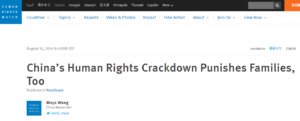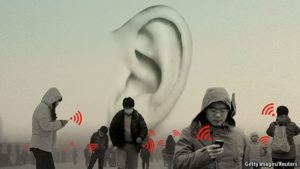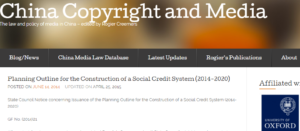THE CHINA DREAM OF PERFECT SURVEILLANCE AND CORRECTION OF ALL CITIZEN BEHAVIOUR
BLOG 1 OF 4 ON CHINA’S NEW REGIME OF REWARD AND PUNISHMENT
As a rapidly rich China seeks perfection, old Confucian norms slide quietly into Communist Party goals and programs of mass behavioural compliance. What could be more Confucian than the massive effort under way to enforce compliance with compulsory sincerity?
To Westerners, it might seem sincerity, undoubtedly a virtue, cannot be forced, commanded, or compelled, lest under compulsion it manifests insincerely. Confucian tradition however argues that behavioural compliance, even when not heartfelt, educates the heart to follow, so a pedagogy of behaviour modification is beneficial. If the tutelary state works consistently to modify behaviour, then the human capital of the whole society is raised to a more civilised level, and the China Dream is closer to being realised.
Honesty and sincerity flow upward, up the Confucian hierarchy, from sister to brother, from younger to older, wife to husband, villager to clan all the way up to the sovereign party-state. Sincerity is intrinsic to what in English (in a quaint 19th century locution) is called filial piety, which entails submission of the lower to the higher, manifesting as humility and sincerity. There is little expectation that those at the peak of the hierarchy should in turn manifest sincerity. Sincerity is what is expected of one’s inferiors, as they strive to win credibility by compliance with what is required of them.
China’s drive to engineer a pervasive “social credit” system has been called an experiment in Totalitarianism 2.0, a Leninist reversion to the worst of Soviet-inspired centralism, a massive experiment in social engineering; a hi-tech big data driven experiment in Orwellian thought control, but seldom a Confucian model of 24/7 surveillance, rewards and punishments for displays of sincerity.
Confucian it is, though what Confucius would have made of today’s elaborate plans to reward compliant citizens and punish the noncompliant is not at all sure. Elaborate is an understatement of the panopticon plans, the stream of State Council “Guidelines” issued, as China gears up to its 2020 goal of total surveillance and behavioural correction of all citizens all the time. Not only will this require behavioural displays of submissive sincerity by all citizens towards state authority, China’s biggest corporate generators of big data play a key role, and even foreign investors in China are expected to comply, and be rated for compliance, on an ongoing basis.
This is what the party-state proudly calls a “top-level design”, (顶层设计) an over-arching taking command, setting the categories all must dwell within, defining the universe of discourse. Top-level design is a phrase in common use in China, where it applies not only to the design of software but to designing anything modern, including education, water conservancy and land consolidation. Top-level design connotes not only superiority but above all rationality, comprehensiveness, an ability to think of everything and fit all into a framework that leaves out nothing.
This is the preeminent domain of the state, not only in relation to society, but also as distinct from the party. In the institutionalised party-state, it is undoubtedly the party that is in charge, the authorial voice of all initiative and direction; but it is the state that must have capability of effecting the will of the party. Top-level design of sincerity work is now the top task of the state, as evident in the language of China’s State Council, the top level of state power. In a “Guiding Opinion” instructing all levels of government, issued in the last days of 2016, the State Council states: “In order to carry forward the traditional virtue of sincerity, strengthen the sincerity consciousness of members of society, strengthen the construction of a personal sincerity system, praise sincerity and punish trust-breaking, raise the credit levels of the entire society and create a beneficial credit environment, with the approval of the State Council, these Opinions are hereby put forward. Guiding ideology. Comprehensively implement the spirit of the 18th Party Congress,………… forcefully carry forward a sincerity culture, accelerate the construction of personal sincerity records, perfect mechanisms for personal information security, privacy protection and credit recovery, complete incentive mechanisms for keeping trust and punitive mechanisms for breaking trust, ensure that trust keepers receive benefits and trust-breakers are subjected to restrictions, let sincerity become a common value pursuit and behavioural norm for all of society, vigorously create a benign social environment where “promise-keeping is glorious and trust-breaking shameful”.
From the outset, this is a reward-and-punishment system, along a spectrum from full behavioural compliance through to criminal non-compliance. The vision is utterly dualistic, predicated on binary opposites that constitute each other. Sincerity is defined by its’ Other: trust-breaking, and vice versa. The key Chinese term for sincerity is often translated as honesty.
This official Guiding Opinion, one of several issued by the State Council, is lengthy, so should be read in full to appreciate its insistence on shaping the thoughts of all citizens. It states: “Let sincerity education permeate into the overall process of citizens’ morality construction and spiritual civilization construction. Strengthen education about social morality, professional ethics, household virtue and personal valour, and create a social atmosphere where “keeping promises is glorious, breaking trust is shameful, and not having trust is fearful”.
Thus is the new social contract drawn. The duties of all citizens are clear. If citizens do have rights as well as responsibilities, these are not inborn but granted by the state, and can be withdrawn when the citizen transgresses, necessitating punishment instilling fear. There are no inalienable, inborn rights, in keeping with Confucian traditionalism.
A CONTRACT FOR PUNISHING DIFFERENCE
Yet this is not only a contract between the individual and the state. Capitalist China’s corporate wealth accumulation is now so well advanced that actual ability to monitor citizen behaviour rests more in corporations than in the state, especially if all citizens are to be monitored, in real time.This is the realm of big data; the corporate capture of citizen behaviour every time one makes an e-commerce transaction. Thus the State Council’s definition of promise breaking and breach of trust is skewed towards the evils of gaming the market, not paying one’s bills on time, cheating the big corporations. The key concept is social credit, to such an extent that coverage outside China of this top-level project usually calls the entire scheme “social credit”.
The State Council instructs all to: “Implement joint punishment against grave trust-breakers in focus areas. Adopt joint punishment for grave trust-breaking activities against individuals who gravely endanger the physical health and the safety of the lives of the popular masses, who gravely destroy the fair competitive order of the market and the regular order of society, who refuse to carry out legal duties and gravely influence the creditability of judicial and administrative bodies, as well as refuse to carry out national defence duties. List gravely trust-breaking individuals who maliciously avoid debts, illegally raise funds, commit telecommunications fraud or online fraud, commit traffic violations, do not pay taxes sincerely and according to the law, etc., as focus supervision targets, and adopt administrative restrictions and punitive measures according to laws and regulations. At the same time as jointly punishing trust-breaking enterprise and undertaking work units, adopt corresponding joint punishment measures against related responsible persons according to the provisions of laws, regulations and policies, and implement joint punishment down to persons. Encourage that grave trust-breaking records emerging from an individual’s economic activities in the marketplace collected by basic financial credit information databases and personal credit investigation bodies are submitted to the nationwide credit information sharing platforms, as reference to carry out credit punishment measures.”
Sinning against the market is conflated with crimes against public safety, those “who gravely destroy the fair competitive order of the market and the regular order of society” are those with most to fear once big data fulfils its potential, scheduled for 2020. The technologies enabling the state and the biggest data gatherers to work together are well-known: “Use the citizen identity number as a basis to build uniform citizen social credit coding systems. Promote citizen identification and fingerprint information registration work, and realize complete coverage of the uniform citizen social credit code. Use informatized technological means to incessantly strengthen personal identity information checking work, and ensure the uniqueness of personal identification information.”
 This partnership of the state and enterprises mirrors the entrenched party-enterprise relationship of crony capitalism with Chinese characteristics. At every turn, enterprises, if they are to succeed, must obtain permissions from endless bureaucracies insisting their regulatory approval is required. Building the necessary networks, enabling the discreet payment of gifts, favours and banquets enables a corporation to function. For it to succeed, it usually needs more: special favours, access to cheap loans available only from official policy banks, access to credit, contracts to supply state organs, market access to territories under official jurisdictions, etc. For senior executives, cultivation of networks within the party-state is a full-time task, to be done with much skill and damage to the liver. In times of official party campaigns against corruption, even greater discretion is needed.
This partnership of the state and enterprises mirrors the entrenched party-enterprise relationship of crony capitalism with Chinese characteristics. At every turn, enterprises, if they are to succeed, must obtain permissions from endless bureaucracies insisting their regulatory approval is required. Building the necessary networks, enabling the discreet payment of gifts, favours and banquets enables a corporation to function. For it to succeed, it usually needs more: special favours, access to cheap loans available only from official policy banks, access to credit, contracts to supply state organs, market access to territories under official jurisdictions, etc. For senior executives, cultivation of networks within the party-state is a full-time task, to be done with much skill and damage to the liver. In times of official party campaigns against corruption, even greater discretion is needed.
The party-state remains deeply ambivalent about corporate capitalism, which is both the engine of growth and personal wealth accumulation, but also disruptive, disorderly, corrupting and addictive. This ambivalence is no longer dealt with by favouring the state-owned corporations, leaving private enterprises to fend for themselves. That too is a recipe for disaster, and for popular mistrust to grow, both against corporate fraud and official failures to catch fraudsters in time.
This ambivalence about capitalist China has Confucian roots. There is something too anarchic, unpredictable, even dangerous about the creative destruction inherent to capitalism. Thus the need for a strongly regulative state is reinforced, albeit a state in deep partnership with corporate big data generators. Order must be maintained, stability is paramount, while wealth accumulation continues to accelerate.
This raises further dilemmas for a state ever inclined to assert its power to implement the will of the party. The state must be seen to be powerful, yet it must, in the right circumstances, waive its regulatory power if it is to reward those with the highest social credit rankings, be they citizens or corporations. In a longer State Council directive of May 2016 all levels of government in all provinces are instructed: “In the implementation of all kinds of preferential government policies for financial capital arrangements, supplementary preferential policies for attracting investment and raising funds, etc., priority consideration is to be given to sincere market subjects, and support strengthened.” In practice, it is the state, more accurately the party-state that awards “sincere market subject” status to corporations, and then rewards them accordingly, the necessary networking having been accomplished in private. Crony capitalism is not threatened.
The gaze of the state cannot be returned, as Chinese critics point out: “’The government asks people to be honest, but it excludes itself from such scrutiny,’ says Zhu Dake, a Humanities professor at Tongji University in Shanghai. ‘The government should be watched as well, but who’s watching them?’ he adds. ‘Should we develop another app that allows the people to monitor them? If we did, they’d accuse us of breaking the law.’ Zhu says unilateral grading from a nationwide social credit system could lead to what he calls ‘credit totalitarianism. Where will this lead? They could easily expand the criteria and start judging people on moral or ideological grounds. They’re using modern technology to create a vision of Orwell’s 1984.’”
FINDING SOMEONE TO BLAME
For the entire system to operate as planned, someone must be threatened, fearful and punished. If casual urban jaywalkers and slow billpayers are to fear falling further into social deficit, there must be negative examples, further down the slide, exemplary in their utter discredit. There must be a special hell that exemplifies the fate of those utterly without credit, without sincerity, those wilful trust-breakers who flout all civilised norms and fail to show any gratitude at all for the benevolence of the state. In short, this is Tibet.
The Tibetans are utterly untrustworthy; all Han Chinese know this, having been thus instructed by state media in 2008, endlessly repeating the mantra: killing, smashing, looting, burning as the defining characteristics of all Tibetans. Anyone who, for example, sees a doco shot on the streets of Beijing, of Tibetan street vendors setting out a small rug of classic Tibetan silver jewellery for sale, being immediately chased away by an angry Han woman at her nearby street food stall, witnesses the instant racist contempt of Han for Tibetans. Just such a doco is Nowhere to Call Home, filmed by NPR correspondent Jocelyn Ford, which then takes us to a police station, where the Tibetan woman pleads for her confiscated roll of silverware to be returned, to be met by more anger, suspicion and a curt order to leave the neighbourhood.
Ninety-seven percent of all the Tibetans live under China, only three percent are in exile, scattered around the world. In China’s eyes, those six million citizens are collectively guilty of insincerity, untrustworthiness, ingratitude, wilful disobedience and treacherous disloyalty, since their hearts belong to a foreign lama. All this is so well known it needs no debating or discussion; it is self-evident.
Collective punishment for collective guilt is an old Chinese tradition of Confucian statecraft, and is much practiced today. Equally collectively guilty are the entire  Uighur nation of Xinjiang province to the immediate north of Tibet. Of China’s 56 officially recognised ethnicities, only these two have failed to assimilate to the Han norm, and the very fact that only two out of 56 remain stubbornly deviant in itself counts as proof of their insincerity, and failure to respect natural hierarchy. The Tibetans and the Uighur have hurt the feelings of the Chinese people, and they don’t show the slightest sign of remorse.
Uighur nation of Xinjiang province to the immediate north of Tibet. Of China’s 56 officially recognised ethnicities, only these two have failed to assimilate to the Han norm, and the very fact that only two out of 56 remain stubbornly deviant in itself counts as proof of their insincerity, and failure to respect natural hierarchy. The Tibetans and the Uighur have hurt the feelings of the Chinese people, and they don’t show the slightest sign of remorse.
The frequent instructions issued by the State Council and the central planners of the National Development Reform Commission announcing the arrival of the mandatory sincerity program emphasize individual compliance. Likewise, media coverage offers stories of casual noncompliance and the shameful consequences of being caught by surveillance technology and big data doing something untrustworthy. A Wall Street Journal article sets the scene: “Gan Liping pumped her bike across a busy street, racing to beat a crossing light before it turned red. She didn’t make it. Immediately, her face popped up on two video screens above the street. “Jaywalkers will be captured using facial-recognition technology,” the screens said. Facial-recognition technology, once a specter of dystopian science fiction, is becoming a feature of daily life in China, where authorities are using it on streets, in subway stations, at airports and at border crossings in a vast experiment in social engineering. Their goal: to influence behavior and identify lawbreakers. Ms. Gan, 31 years old, had been caught on camera crossing illegally here once before, allowing the system to match her two images. Text displayed on the crosswalk screens identified her as a repeat offender. “I won’t ever run a red light again,” she said. Unfettered by privacy concerns or public debate, Beijing’s authoritarian leaders are installing iris scanners at security checkpoints in troubled regions and using sophisticated software to monitor ramblings on social media. By 2020, the government hopes to implement a national “social credit” system that would assign every citizen a rating based on how they behave at work, in public venues and in their financial dealings.”[1]
The focus is on the individual, in the hope of convincing hundreds of millions of Gan Lipings that losing social credit by biking too slowly across an intersection just isn’t worth it. The compliance of a thousand million citizens is best accomplished by their active, individual embrace of the technologies that automatically verify their compliance every time they shop online or pay a bill or get across an intersection before the lights change. Each citizen transacts such transactions many times daily, accumulating a data trail ripe for monetisation and for the state’s compulsory sincerity behaviour modification campaign.
This is a fortunate alignment of the stars, giving corporate China and the party-state ever more in common.  The main beneficiary is Jack Ma, China’s richest man, friend of Donald Trump, head of Alibaba, the e-commerce big data provider whose fortune is guaranteed by the party-state’s exclusion of its American competitors entry to China. Alibaba makes money every time a consumer orders anything online. Alibaba has long had every reason to track its customers credit-worthiness; all it had to do was sell to the party-state the idea that credit worthiness is a proxy for sincerity and trust worthiness, in fact they are the same thing.
The main beneficiary is Jack Ma, China’s richest man, friend of Donald Trump, head of Alibaba, the e-commerce big data provider whose fortune is guaranteed by the party-state’s exclusion of its American competitors entry to China. Alibaba makes money every time a consumer orders anything online. Alibaba has long had every reason to track its customers credit-worthiness; all it had to do was sell to the party-state the idea that credit worthiness is a proxy for sincerity and trust worthiness, in fact they are the same thing.
[1] Josh Chin and Liza Lin, China Tracks Faces to Shape Behavior: New technology taps camera data in vast social-engineering experiment, Wall Street Journal, 27 June 2017



